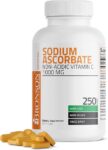
Non Acidic Vitamin C

Non Acidic Vitamin C: Benefits, Uses & Why It’s Ideal for Sensitive Skin and Stomach
Vitamin C is widely recognized as one of the most powerful antioxidants, essential for boosting immunity, enhancing skin health, and supporting overall wellness. However, many people hesitate to use traditional vitamin C (ascorbic acid) supplements due to its acidic nature, which can cause stomach irritation and skin sensitivity. This is where non acidic vitamin C comes into play-delivering all the benefits of vitamin C without the drawbacks of acidity.
What is Non Acidic Vitamin C?
Non acidic vitamin C typically refers to vitamin C formulations that are either buffered or combined with mineral salts, resulting in a neutral or near-neutral pH level. Unlike pure ascorbic acid, which has a low pH (acidic), these vitamin C variants are gentler on the digestive tract and less likely to cause skin irritation when applied topically.
Types of Non Acidic Vitamin C
- Sodium Ascorbate: A buffered form of vitamin C combined with sodium, making it non acidic and easier on the stomach.
- Calcium Ascorbate: Vitamin C bound with calcium, providing added mineral support and reduced acidity.
- Magnesium Ascorbate: A magnesium salt of vitamin C, gentler for those with sensitive digestion.
- Ascorbyl Palmitate: A fat-soluble form of vitamin C used in skincare, well tolerated by sensitive skin.
Benefits of Non Acidic Vitamin C
Choosing a non acidic vitamin C supplement offers several advantages beyond the standard benefits of vitamin C:
- Reduced Gastric Irritation: Unlike ascorbic acid, non acidic vitamin C is less likely to cause heartburn, indigestion, or stomach upset, making it suitable for people with sensitive digestive systems or acid reflux.
- Gentle on Sensitive Skin: When applied topically, non acidic forms minimize stinging, redness, or flaking often triggered by acidic vitamin C serums.
- Enhanced Absorption and Bioavailability: Buffered vitamin C forms maintain vitamin stability and provide sustained action, improving absorption.
- Mineral Boost: Forms like calcium or magnesium ascorbate provide additional essential minerals beneficial for bone and muscular health.
- Suitable for Daily Use: Due to its gentle nature, non acidic vitamin C can be used more frequently and in higher doses without adverse effects.
Non Acidic Vitamin C vs. Ascorbic Acid: A Quick Comparison
| Aspect | Non Acidic Vitamin C | Ascorbic Acid |
|---|---|---|
| pH Level | Neutral to Slightly Alkaline (6-7.5) | Acidic (pH ~3) |
| Stomach Tolerance | Gentle, less irritation | May cause upset or heartburn |
| Skin Sensitivity | Ideal for sensitive skin | Can cause redness or stinging |
| Mineral Content | May contain calcium, magnesium, sodium | None |
| Cost | Slightly higher | Lower |
How to Choose the Best Non Acidic Vitamin C Supplement
Not all vitamin C supplements are created equal. When selecting a non acidic vitamin C, consider these tips:
- Look for Buffered Forms: Opt for sodium, calcium, or magnesium ascorbate for a gentler effect.
- Check Purity: Ensure the product contains high-quality, pure vitamin C with minimal fillers or additives.
- Formulation Type: Choose powder, capsules, or topical serums depending on your intended use.
- Certifications: Select supplements that are third-party tested and certified for potency and safety.
- Dose Appropriateness: Consult a healthcare provider to determine the right dose for your needs.
Practical Tips for Using Non Acidic Vitamin C
- Start with a low dose to gauge tolerance and gradually increase.
- Use non acidic vitamin C serums in the morning with sunscreen for maximum antioxidant protection.
- When taking supplements, consume with food to improve absorption.
- Store vitamin C products away from heat and light to preserve potency.
Real-Life Case Study: Non Acidic Vitamin C and Sensitive Skin
Jessica, a 32-year-old woman with sensitive skin, struggled for years with irritation using traditional ascorbic acid serums. After switching to a magnesium ascorbate-based serum, she noticed:
- Reduced redness and stinging upon application
- Smoother, brighter complexion within 4 weeks
- No dryness or peeling, even with daily use
This experience is common among users who switch to non acidic vitamin C products, confirming their gentler nature while maintaining effectiveness.
Frequently Asked Questions (FAQs)
Is non acidic vitamin C as effective as regular vitamin C?
Yes, non acidic vitamin C forms provide similar antioxidant benefits and immune support. Buffered forms also enhance tolerability without compromising efficacy.
Can I use non acidic vitamin C serum if I have rosacea or eczema?
Yes, non acidic vitamin C is often recommended for sensitive and reactive skin types, including conditions like rosacea, due to minimal irritation risk.
Are there any side effects of non acidic vitamin C?
Side effects are rare but may include minor skin sensitivity or mild digestive upset if taken in very high doses. It’s best to follow recommended guidelines.
How long does it take to see results?
Visible skin benefits may take 4 to 6 weeks of consistent use, while immune benefits depend on overall diet and lifestyle factors.
Conclusion
Non acidic vitamin C offers a fantastic alternative for individuals who want the powerful health and skincare benefits of vitamin C without the drawbacks of acidity. Whether you have a sensitive stomach, delicate skin, or simply want a more comfortable vitamin C experience, buffered forms like sodium ascorbate, calcium ascorbate, or magnesium ascorbate are well worth considering. By choosing the right product and following practical usage tips, you can enjoy enhanced antioxidant protection and radiant skin with minimal irritation.
Ready to upgrade your vitamin C routine? Explore non acidic vitamin C supplements and serums today for a gentler, smarter way to support your health and glow!






